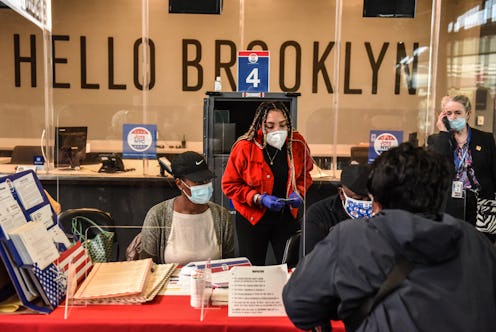(Beauty)
The Key Safety Precaution Every Poll Worker Should Know Before Volunteering

In the 2016 election, a whopping 56% of poll workers were over the age of 61, according to the U.S. Election Assistance Commission. This year, however, due to the health risks associated with COVID-19, those numbers are expected to be far less, putting the pressure on younger demographics to step up and fill the void. However, the question still looms: How can poll workers stay safe during this 2020 election?According to the experts, there's no concrete guarantee of safety, but there are precautions and measures that one can and should take.
Before considering taking on the role, Dr. Purvi Parikh, MD, an allergist and immunologist with the Allergy and Asthma Network, suggests consulting a medical professional. "It depends on the person," she says. "But if you [belong to a high-risk, group like] elderly, diabetes, heart disease, obese, chronic lung disease or of certain ethnic backgrounds, you may want to clear it with your physician first." And with asthma being a pre-existing condition that impacts many, that applies further. "Asthma is a high-risk condition not only for COVID-19 but also for flu and other upper respiratory infections," she says. "Make sure you take your preventative medication as prescribed, flu and pneumonia vaccines if you are due, and get clearance from your asthma specialist. Also, do not participate if your asthma is flaring or have a fever, cough, nasal congestion, recent travel, or loss of sense or smell."
So if you are cleared to volunteer, or don't belong to any high-risk groups, check out the safety precautions you should be taking while at the polls.
Being A Poll Worker: Infection Prevention
Long before you step foot in a poll center, you should be preparing your immune system to be at its strongest levels. Dr. Erika Schwartz, MD a preventative medicine specialist says that prevention is the first step in insuring your safety. "It's about boosting your immune system at all times," she says. "Not because of COVID-19, but just in general. Some of these practices include exercise on a regular basis, sleeping eight hours a night, meditating, and managing stress." She says that the management of stress is one of the foremost things one can do during these particular times to keep their body healthy. "We're talking about a very stressful time for everybody," she says. "Depression is becoming pervasive because people don't know what to do with themselves."
She says one way to handle these stressors is through increased vitamin use. "There are so many supplements that everyone should be incorporating into their routines," she says. "These include vitamin C, zinc, probiotics, fish oil, and lactoferrin, just to name a few." However, Dr. Schwartz is adamant that just the supplements alone won't work, and other changes must be incorporated as well. "It's like a puzzle," she says. "The more pieces we put together the more the picture will emerge. So you have to watch what you're eating, and furthermore, limit your alcohol intake. Alcohol decreases our immune system's ability to fight off infections, so always make water your first choice."
Being A Poll Worker: During Your Shift
While at the polls, it's important to protect yourself and others by following CDC protocols. "It's about changing our mentality and our regular practices," Dr. Schwartz says. "That means, continued social distancing, properly wearing an adequate face mask, and washing your hands frequently." She also says that if you can control it, don't take on too long of a shift. "Try not to spend too many hours in one area," she says. "That's one of the trials that healthcare workers have faced that makes them more vulnerable. They work too long of shifts without ample opportunity to change their face masks, wash their hands, eat, and hydrate. So even when you're at the polls, you have to prioritize taking care of yourself first, then everything else second."
Dr. Schwartz advises against touching your mask frequently, urging volunteers to bring extras so that they can be switched out if necessary. She also encourages keeping hand sanitizer on your person. "Make sure that the sanitizer you're using has an alcohol content of over 80%," she says. "Anything under that number won't properly kill germs the way you need and, due to the constant touching of papers and other things at the polls, constant sanitizing is a must."
Being A Poll Worker: Post-Shift
While removing a mask has become the new removing your bra, in that it's something one rushes to do, Dr. Schwartz warns against doing so prematurely, explaining you should wait until you're far enough away from the crowds. "When you are in your car alone, far away from the masses, that's when it's safe to remove," she says. However, before that, she advises washing your hands thoroughly before doing so. "Completely sanitize your hands," she says. "The last thing that you want is to bring the germs that you've encountered while at the polls to be brought with you and placed on your face." Once home, it's also imperative to immediately wash your clothes and, depending on your mask, wash that as well.
Dr. Parikh says you should also limit your social interactions. "You may want to consider not visiting with high-risk family members while you are working at the polls," she says. "I also recommend checking your temperature on a daily basis so you do not inadvertently expose others."